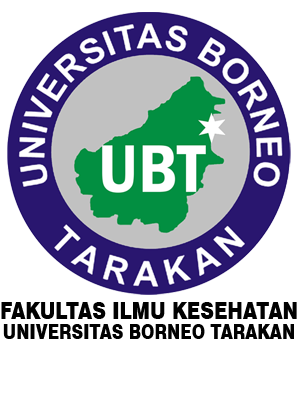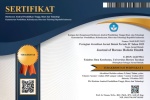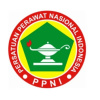Efektifitas Elektronik Early Warning System dalam Identifikasi Perburukan Neonatus di Unit Perawatan Intensif: Studi Literatur Review
Abstract
Penggunaan early warning system pada neonatal di unit perawatan intensif secara elektronik dapat membantu memberikan informasi yang adekuat dan berkelanjutan terhadap pengambilan keputusan klinis sehingga penatalaksanaan yang diberikan pada neonatal secara tepat dan cepat. Hal ini penting untuk dikembangkan karena neonatal merupakan kelompok usia yang sangat rentan terjadinya perburukan klinis dan sangat cepat untuk terjadinya kegagalan fungsi organ hingga kematian. Informasi terkait dilakukan pencarian jurnal dari researchgate, ebsco, sage hingga google scholar dengan kata kunci early, electronics, deterioration, neonatal, warning, dan ditemukan sepuluh jurnal terkait dengan rentang waktu publikasi dari tahun 2008 hingga 2018. Penggunaan elektronik neonatal early warning system dan aplikasi skor ‘HeRo’ (Heart Rate Observation) dalam mengidentifikasi dini kondisi perburukan klinis neonatal di unit perawatan intensif menunjukkan penurunan signifikan terhadap angka kesakitan, kematian dan lama perawatan intensif.
Full Text:
PDF (Bahasa Indonesia)References
Assessment, O. (2015). Canberra Hospital and Health Services Clinical Procedure Occupational Assessment , Screening and Vaccination, 1–47.
Collins, S. A., Cato, K., Albers, D., Scott, K., Stetson, P. D., Bakken, S., & Vawdrey, D. K. (2013). Relationship between nursing documentation and patients’ mortality. American Journal of Critical Care, 22(4), 306–313. https://doi.org/10.4037/ajcc2013426
Davison, K. K., & Birch, L. L. (2008). NIH Public Access, 64(12), 2391–2404. https://doi.org/10.1038/jid.2014.371
Ellsworth, M. A., Lang, T. R., Pickering, B. W., & Herasevich, V. (2014). Clinical data needs in the neonatal intensive care unit electronic medical record. BMC Medical Informatics and Decision Making, 14(1). https://doi.org/10.1186/1472-6947-14-92
Fairchild, K., & Aschner. (2012). HeRO monitoring to reduce mortality in NICU patients. Research and Reports in Neonatology, 65. https://doi.org/10.2147/RRN.S32570
Fairchild, K. D., & O’Shea, T. M. (2010). Heart Rate Characteristics: Physiomarkers for Detection of Late-Onset Neonatal Sepsis. Clinics in Perinatology, 37(3), 581–598. https://doi.org/10.1016/j.clp.2010.06.002
Jones, S., Mullally, M., Ingleby, S., Buist, M., Bailey, M., & Eddleston, J. M. (2011). Bedside electronic capture of clinical observations and automated clinical alerts to improve compliance with an Early Warning Score protocol. Critical Care and Resuscitation, 13(2), 83–88.
Kim, U. O., Brousseau, D. C., & Konduri, G. G. (2008). Evaluation and Management of the Critically Ill Neonate in the Emergency Department. Clinical Pediatric Emergency Medicine, 9(3), 140–148. https://doi.org/10.1016/j.cpem.2008.06.003
Paliwoda, M., & New, K. (2015). Neonatal early warning tools: A literature review (Vol. 18). Retrieved from http://remote-lib.ui.ac.id:2247/ContentServer.asp?T=P&P=AN&K=109821629&S=R&D=rzh&EbscoContent=dGJyMMvl7ESep7M4zdnyOLCmr1CeprRSrq%2B4S7GWxWXS&ContentCustomer=dGJyMPGnrkqurrJJuePfgeyx44Dt6fKF49oA
Roland, D., Madar, J., & Connolly, G. (2010). The Newborn Early Warning (NEW) system: development of an at-risk infant intervention system. Infant, 6(4), 116–120. Retrieved from https://pdfs.semanticscholar.org/edbc/06260ef4876c13c172f6610d0373c8949319.pdf
Schwartz, S. M. (2016). Can an automated early warning system derived from continuous physiologic monitoring prevent disaster? Journal of Thoracic and Cardiovascular Surgery, 152(1), 3–4. https://doi.org/10.1016/j.jtcvs.2016.04.014
Yi, C. M. (2017). Chan Man Yi, NC (Neonatal Care) Dept. of Paed. & A.M., PMH 16 May 2017, (May).
DOI: https://doi.org/10.35334/borticalth.v1i2.480
Refbacks
- There are currently no refbacks.









